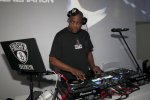Schomburg Center for Research in Black Culture
Amidst rumors of Harlem’s long-standing Schomburg Center for Research in Black Culture, on the corner of 135th Street & Malcolm X Blvd., relocating to a spot in downtown Manhattan, more attention has been paid recently to the legendary educator whom it is named after.
A self-described ‘Afro-Borinqueño’ (Afrikan/Black-Puerto Rican), Arturo (a.k.a. Arthur) Alphonso Schomburg is a self-educated scholar, writer and activist who revealed many of the significant contributions Alkebulan/Afrika and its original inhabitants have made to the civilizations throughout the world.
Arturo was birthed on January 24th 1874, in Santurce, Puerto Rico, to Carlos Féderico Schomburg: a merchant of German heritage and Maria-Josefa: a Black mid-wife from St. Croix, Virgin Islands – where he spent part of his childhood.
‘Blacks have no history, heroes or notable accomplishments,’ Schomburg quoted his 5th grade teacher as once telling him. This incorrect claim inspired the youth to pursue the truth concerning his people’s lost ancestry, and disprove the misinformed, racist instructor.
“We have reached the crucial period of our educational existence. The [Caucasian] institutions have their chair of history – it is the history of their own people – and whenever [Afrikans] are mentioned in the text-books it dwindles down to a footnote. Cases can be shown right and left of palpable omissions,” Arthur later assessed as an adult.
Adding, “We need a collection or a list of books written by our men and women. Where are our historians to give us our side and our chair of [Afrikan] history, to teach our people our own history? We are at the mercy of the ‘flotsam and jetsam’ of the [Caucasian] writers.”
On April 17th 1891 he migrated to Harlem’s W140th Street – increasing his interest in revolutionary activities, studying and documenting the liberation movements in Puerto Rico, Cuba and Haiti. Arthur was then getting more intimately involved with his Afrikan studies and writings, becoming an integral influence during the Harlem Renaissance, working alongside Claude McKay, Langston Hughes and Paul Robeson.
“We need the historian and philosopher to give us with trenchant pen, the story of our forefathers, and let our soul and body, with phosphorescent light, brighten the chasm that separates us. We should cling to them just as blood is thicker than water,” suggested Schomburg.
He practiced the Pan-Afrikan paradigm before it was popular to do so, understanding the importance of uniting English-speaking and Spanish-speaking Afrikans with each other, as well as with those in the Motherland, and others throughout the Diaspora too.
In fact, the bilingual Schomburg married 3 English-speaking Black women from the U.S. who bore him 7 children.
The erudite activist possessed an insatiable appetite for knowledge, accumulating literature and artifacts which confirmed his Afrikan-primacy thesis. Although the heritage of Afrikans presiding in the Caribbean, as well as those in Central & South Amerikkka, is what initiated his educational quest – he collected information and many rare items from throughout the Afrikan Diaspora, becoming the world’s foremost collector on Afrikan culture.
In 1911 he and John Edward Bruce co-founded the Negro Society for Historical Research and in 1914 Arthur joined the American Negro Academy, aligning intellectual forces with two other great Afrikan minds – Carter G. Woodson and W.E.B. Dubois.
Schomburg’s family moved to Bed-Stuy in 1918, while still maintaining ties to Harlem. He prolifically penned pieces about Afrikan people’s search for their ancestry and heritage, namely the essay – “The Negro Digs Up His Past” – in 1925.
A teenaged John Henrik Clarke sought-out Schomburg after reading it, becoming his protégé, later admitting:
“He opened up my eyes to the fact that I came from an old people, older than slavery, older than the people who oppressed us. I wanted to know the whole history of my people all over the world!”
“’Sit down, son,’ he said… ‘What you’re calling – Afrikan history, Negro history – are the missing pages of World history. Read the history of the people who took you out of history, and you will find out why they were so insecure [that] they had to take you out of history, why they could not stand for your history to compete with theirs.’”
“Once I began to have some background in European history, I could bring Afrikan history into proper focus. Arthur Schomburg, more than any other single human being, set me in motion in the pursuit of a career as a teacher of history,” revealed Dr. Clarke – the master teacher.
Also, renowned Kemetaphysician Dr. Yosef ben-Jochannan also credits the autodidact scholar with helping to steer him in the right direction as well.
The New York Public Library and the Carnegie Corporation purchased 10,000 items from Schomburg’s personal collection in 1926 to put on display at its 135th Street branch, which was eventually named after him in 1940.
This is where many respected researchers went to uncover their valuable sources, such as Dr. Ben, who previously worked alongside Schomburg in Puerto Rico; Malcolm X; Allah, the Father and Dr. Khalid Abdul Muhammad.
Following dental surgery, Schomburg fell ill and made his transition at Madison
Park Hospital, on June 8, 1938 in Brooklyn and was later buried in Cypress Hills Cemetery.
“The Amerikkkan [Black man] must remake his past in order to make his future. Though it is orthodox to think of Amerikkka as the one country where it is unnecessary to have a past, what is a luxury for the nation as a whole becomes a prime social necessity for [Blacks]. For him, a group tradition must supply compensation for persecution, and pride of race the antidote for prejudice.
History must restore what slavery took away, for it is the social damage of slavery that the present generations must repair and offset!” Schomburg contends.
More Enlightening Coverage Below:
The GODS Of Hip-Hop: A Reflection On The Five Percenter Influence On Rap Music & Culture
Remembering El Hajj Malik El Shabazz/Malcolm X 45 Years After His Death [Video]















